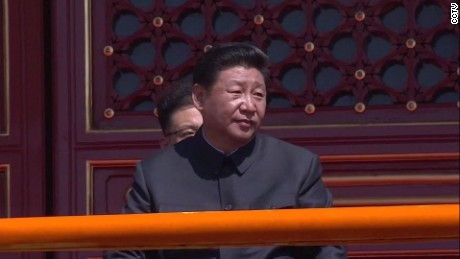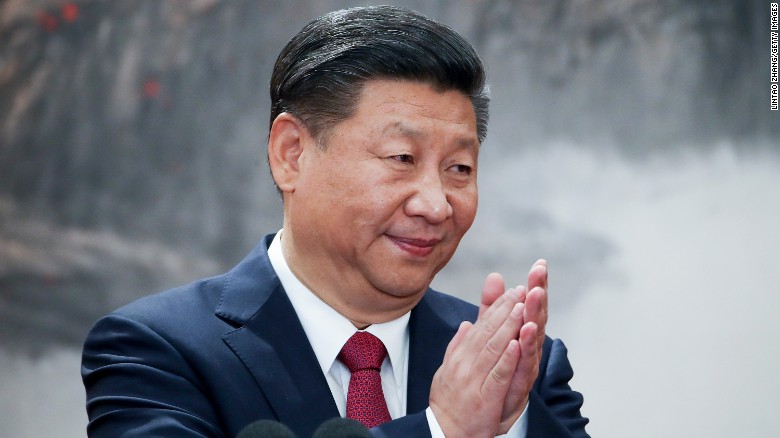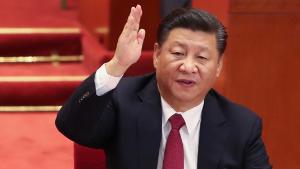President, or Emperor? Xi Jinping pushes China back to one-man rule
Hong Kong (CNN)The announcement Sunday that China will drop term limits on the presidency clears the way for Xi Jinping to rule the country indefinitely.
However, analysts warned that what initially seems like a demonstration of absolute power could actually be a sign of weakness, with Xi apparently unwilling to allow the rise of a potential political rival.
This could lead to future instability in the world's most populous country as wannabe successors jockey for power within a Communist Party (CCP) completely dominated by the 64-year-old Xi.
And his absolute authority will also leave him vulnerable to absolute blame in the instance of an economic shock or foreign policy crisis.
The latter could be increasingly likely, as Xi's rule so far has been characterized by a more bullish military and diplomatic policy as China seeks to move into a power vacuum left in Asia by a retreating Washington.

Xi Jinping's rise to power (2017) 01:53
China's 'emperor' stocks get boost from Xi Jinping's power bid
Factional politics
Following Mao Zedong's death in 1976-- in the wake of the Cultural Revolution, during which tens of thousands of people were killed and the country was racked by civil war -- his successors moved away from one-man rule towards a consensus system where power was shared by a handful of high-ranking Party officials.
This resulted in relatively straightforward transition of power from Presidents Jiang Zemin to Hu Jintao to Xi Jinping, after each served two five-year terms in office.
Early in Xi's first term however, it became apparent he would seek to buck this trend. He was declared "core leader" of the Party, and state media began building up his public image with the type of hagiography not seen since Mao.
This culminated with "Xi Jinping Thought" being added to the Party constitution last year, at a key meeting in which Xi failed to nominate an obvious successor, fueling speculation he would stay on as leader past 2023.
The plan to drop presidential term limits was announced this week, and is due to go before China's rubber-stamp parliament, the National People's Congress, next month, where it is guaranteed to be approved.
Margaret Lewis, a law professor and expert on China's constitution at Seton Hall University, said under Xi "what we've seen is an increasing lack of sharing of power even among the top leadership."
"Xi's modus operandi is consolidation of power," she said.
That could pose a problem to him in the long run. While Chinese politics is not remotely democratic in the traditional sense, there are certain checks and balances within the Party system itself, with reformers and conservatives seeing their power and influence waxing and waning over time.
Jon Sullivan, director of the China Policy Institute at the University of Nottingham, said Xi remaining as President and head of state, "negates the institutionalization of power transitions that have served the Party well for 35 years, enabling it to avoid damaging schisms that have plagued other Communist regimes."
While many internal CCP matters happen in a black box, most experts agree that there are factions within the party -- such as the so-called "Shanghai clique" around former President Jiang Zemin. Some have argued Xi's far-reaching anti-graft campaign is itself a tool to go after factional enemies and potential rivals.
That anti-corruption campaign will also get a boost with upcoming constitutional changes due to create a National Supervision Commission (NSC) with sweeping new enforcement powers, potentially affecting a much greater swath of China's population.
Message to enemies
Richard McGregor, author of "The Party: The Secret World of China's Communist Rulers," wroteafter Sunday's announcement that it "sends a warning to his legion of enemies at the top of the party who have been hit by the anti-corruption campaign: he is not going anywhere."
"Xi's ability to push this decision through in the short-term is undoubtedly a display of his grip on all levers of power," McGregor wrote. "But the very fact that he feels the need to do so could easily be a sign of something else -- that he is possessed by an urgency to gather even more power than he already has to keep his enemies at bay."
This could result in increased pushback from within the Party, as those who had hoped to weather the Xi storm now have no option but to fight against him out of self-preservation.
According to Sullivan, term limits not only restrict the power of individual leaders, they give other elites and factions the consolation that there would be an opportunity to change the status quo after two terms.
"That 'consolation' is an important pressure valve that prevents crippling inner party battles. By getting rid of it, Xi is banking on being able to contain and neutralize his opponents," said Sullivan.
But doing so, Sullivan added, "will necessitate greater levels of repression, both in society and within the Party-state."
Photos: Chinese President Xi Jinping
Xi talks with hearing-impaired students at a school in Shanghai in 2007.
Hide Caption
18 of 34
Photos: Chinese President Xi Jinping
Xi brings blankets to a villager after ice storms in 2008. That year, Xi became China's vice president.
Hide Caption
19 of 34
Photos: Chinese President Xi Jinping
Xi kicks a soccer ball in 2008 as he inspects a field in Qinhuangdao, China. The stadium was hosting games during the 2008 Summer Olympics.
Hide Caption
20 of 34
Photos: Chinese President Xi Jinping
Xi chats with former US President Jimmy Carter in 2009. Carter was attending a Beijing dinner that celebrated 30 years of US-China relations.
Hide Caption
21 of 34
Photos: Chinese President Xi Jinping
Xi feeds swans during an official visit to Hungary in 2009.
Hide Caption
22 of 34
Photos: Chinese President Xi Jinping
Xi and US Vice President Joe Biden inspect an honor-guard contingent during a welcoming ceremony in Beijing in 2011.
Hide Caption
23 of 34
Photos: Chinese President Xi Jinping
Xi pushes his father as he walks with his wife and his daughter, Xi Mingze, in 2012.
Hide Caption
24 of 34
Photos: Chinese President Xi Jinping
Xi became China's President in March 2013. Here, he walks with US President Barack Obama before a bilateral meeting in Rancho Mirage, California, in June 2013.
Hide Caption
25 of 34
Photos: Chinese President Xi Jinping
Xi meets with former US President Bill Clinton in Beijing in 2013.
Hide Caption
26 of 34
Photos: Chinese President Xi Jinping
Xi visits Cuban leader Fidel Castro in Havana, Cuba, in 2014.
Hide Caption
27 of 34
Photos: Chinese President Xi Jinping
Xi and Peng pose with the Obamas before a state dinner in Washington in 2015.
Hide Caption
28 of 34
Photos: Chinese President Xi Jinping
Xi has dinner with US President Donald Trump at Trump's Mar-a-Lago resort in Florida in April 2017.
Hide Caption
29 of 34
Photos: Chinese President Xi Jinping
Xi shakes hands with teachers and students while visiting a university in Beijing in May 2017.
Hide Caption
30 of 34
Photos: Chinese President Xi Jinping
Xi inspects a military garrison in Hong Kong in June 2017.
Hide Caption
31 of 34
Photos: Chinese President Xi Jinping
Xi shakes hands with Russian President Vladimir Putin before a meeting in Moscow in July 2017.
Hide Caption
32 of 34
Photos: Chinese President Xi Jinping
Xi, center, attends the closing session of the 19th National Congress in October 2017.
Hide Caption
33 of 34
Photos: Chinese President Xi Jinping
US President Donald Trump and XI take part in a welcome ceremony at the Great Hall of the People on Thursday, November 9, 2017, in Beijing during Trump's visit to Asia.
Hide Caption
34 of 34

Photos: Chinese President Xi Jinping
Chinese President Xi Jinping speaks in Beijing's Great Hall of the People on Wednesday, October 25, as the new lineup was unveiled for the Chinese Communist Party's all-powerful Politburo Standing Committee. The new lineup did not include an heir apparent to Xi, who analysts predict will dominate the country's politics for decades to come











